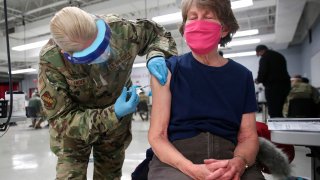
- Even if you're among the early recipients of a Covid-19 vaccine, it will be important to continue wearing a face covering, White House health advisor Dr. Anthony Fauci said.
- That's because researchers are trying to determine whether the drugs prevent people from spreading the virus to others who aren't vaccinated, he said.
- Clinical trials show that the currently deployed vaccines are highly effective at prevention symptomatic Covid-19 infections.
The deployment of life-saving coronavirus vaccines brings hope that life will soon return to a time before the pandemic where we weren't advised to wear a mask nearly everywhere we go.
But even if you're one of the lucky few to have gotten a Covid-19 shot, it will be important to continue wearing a face covering until researchers can determine whether the vaccines prevent people from spreading the virus to others who aren't vaccinated, White House health advisor Dr. Anthony Fauci said Thursday.
"Currently, we do not have enough data to be able to say with confidence that the vaccines can prevent transmission," Fauci said in a tweet during an online Q&A session. "So even if vaccinated, you may still be able to spread the virus to vulnerable people."
What the vaccines' clinical trials have shown, however, is that the drugs are highly effective at preventing symptomatic infections in people who have been inoculated. Both Pfizer-BioNTech's and Moderna's vaccines, the only two in the U.S. that have received emergency authorization so far, have proven to be roughly 95% effective at preventing symptomatic infection in people given two doses spread out weeks apart.
Johnson & Johnson's vaccine, a one-dose jab that has yet to be granted the same authorization from the federal government, reported on Friday that its vaccine was 66% effective overall in protecting against Covid-19 in clinical trials. While lower than the others, it's still above the threshold the federal government set — roughly 50% — to be granted emergency authorization.
On top of that, the company's drug was 85% effective in preventing people from becoming severely ill with Covid-19 four weeks after their shot. The vaccine from J&J could become available in March if it clears the U.S. Food and Drug Administration's standards for emergency use, Fauci said.
Fauci, the director of the National Institute of Allergy and Infectious Diseases, also urged people to accept whichever vaccine available to them once it's their turn.
Researchers are currently collecting follow-up data from people who participated in clinical trials to determine whether the amount of virus they carry in their nose is reduced after vaccination, or if there's "significantly fewer" cases where people don't exhibit any symptoms over the course of their infection.
That would indicate "a decreased ability to transmit the virus following vaccination," Fauci said.
Money Report
Read more: As new Covid vaccines near U.S. debut, here's what you need to know about the shots
Masks, combined with other measures like frequent hand washing and social distancing, have been a critical tool to suppress the spread of Covid-19, medical experts have maintained.
The virus spreads from person-to-person through respiratory droplets that travel through the air when someone talks, coughs, sneezes, sings, or shouts, according to the Centers for Disease Control and Prevention. Face coverings serve as a barrier that can prevent those droplets from spraying to others.
There's now evidence that the masks could also give the wearer some protection from the virus, the CDC says, though how well it works likely depends on the type of mask.
It's also important to remember that most Americans haven't been vaccinated yet, said Dr. Joshua Barocas, a professor at the Boston University School of Medicine. According to recent data from the CDC, just nearly 34 million doses of vaccine have been administered so far.
"We don't know who's unvaccinated. We don't wear it like a badge on our coat. We don't wear our immune function, we don't show our risk factors on our shirts," Barocas said during a call organized by the Infectious Diseases Society of America on Wednesday. "We need a continued multilayered approach."






